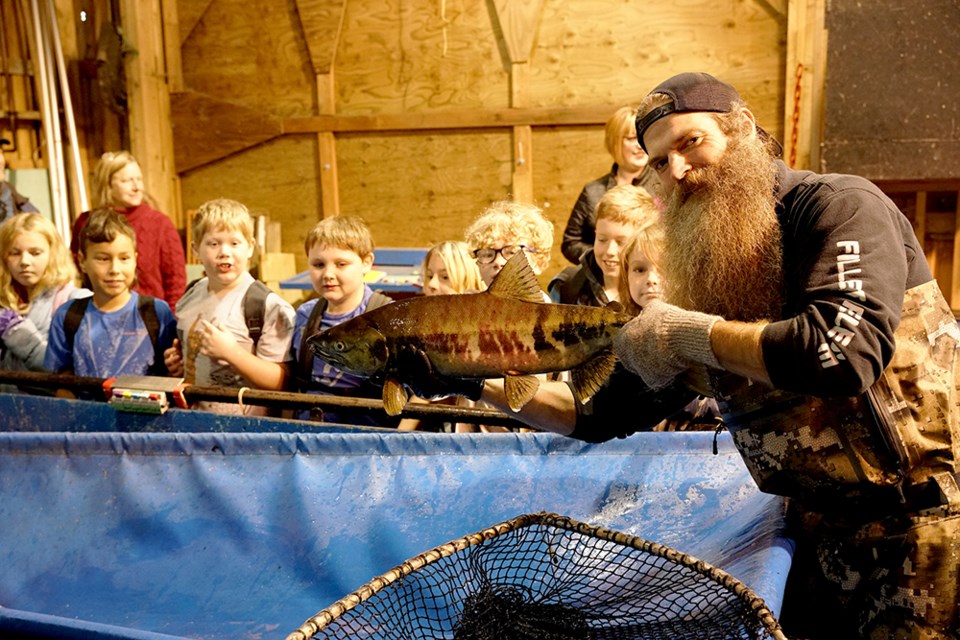Powell River Salmon Society (PRSS) is gearing up to show qathet School District students and members of the public demonstrations of the lifecycle of Pacific salmon.
According to a media release from Enbridge Inc., a Canadian pipeline and energy company, on October 21, PRSS will host its annual salmon education expo at the Alex Dobler Salmon Centre near Lang Creek. Attendees will be treated to a close-up encounter with the salmon in their natural habitat, the release stated. There will be various stations where one can learn to identify the different species of Pacific salmon, understand the lifecycle, and appreciate the crucial role salmon play in the ecosystem. More than 650 students, who reserved their sessions, are also expected to visit the hatchery to have an in-person learning experience from October 16 to 19.
Enbridge, through its fueling futures program, has contributed $5,000 to support the PRSS salmon education program. This is part of the Enbridge’s commitment to support environmental stewardship and awareness, the release stated.
If people cannot make the public information sessions, they can still witness the marvel of salmon coming to life. PRSS has developed an online education platform showing the salmon spawning, plus a livestream of salmon eggs hatching in real-time.
Starting October 31, everyone with internet access can witness about 10 salmon eggs, spawned from the Powell River, develop into tiny fish with egg sacks (called alevin), and then into baby salmon (called fry) in about 20 days, the release stated.
By logging in to salmoneducation.org, salmon enthusiasts can witness the early stages of the salmon development in real-time from the comfort of their own homes or classrooms.
“We’re always trying to push the boundaries, trying to innovate through our live feed,” stated salmon society assistant manager Philip Nakatsu. “During the first round of spawning, the water’s warm, so the salmon eggs grow really fast. You’ll start to see them wiggling inside, and then the eggs will break open and you’ll see them come out. They’ll be tiny fish with egg sacks, called alevin, and then you’ll see them develop into salmon fry.”
Nakatsu stated that the salmon education expo is very popular with kids and classrooms.
“It’s one class after the other going through a series of stations, showing the salmon live and being sorted based on its species,” stated Nakatsu. “They can even touch them. Then, they go to an egg-take area, where we collect and count the eggs. After that, they visit a station where a local volunteer dissects a fish to show its biology, and then goes under a microscope to examine its scales.”
Nakatsu stated that in order to have a sustainable salmon stock, the salmon society has to give the fish a head start in the hatcheries.
“We put them back when they’re ready, giving them a boost until they pass their most vulnerable stage,” stated Nakatsu.
The release stated the website also offers multiple online modules designed for kids of all ages to learn about the salmon run, the salmons’ life stages, and the five different Pacific salmon species of BC. There are resources available for educators to use in their own classrooms, complete with pictures and videos, according to the release.
The PRSS also developed their salmoneducation.org website in collaboration with an Indigenous educator, dedicating a page for learning the traditional language used by different Indigenous groups to talk about salmon.
For more than 40 years, the PRSS has been successfully working to preserve salmon stocks in the Salish Sea through its three hatcheries in Powell River, the release stated. The team, composed of volunteers and employees, retrieve the eggs from the salmon and grow the eggs into baby salmon in their hatcheries before releasing them back in their local watersheds. As one of the largest community-led hatcheries in the region, the organization ensures more than a million of salmon fry are released back to the local watersheds every year. PRSS not only maintains the hatcheries, it also monitors the local watersheds in the Powell River area and proactively shares its knowledge about BC salmon to the public, according to the release.
“The Powell River Salmon Society understands the value of educating both young people and the general public about salmon,” stated Michaela Bjorseth, community and Indigenous engagement manager for Enbridge. “Their online education platform on salmon, coupled with the livestreaming of their growth, presents a remarkable educational resource for all households and classrooms not only in British Columbia, but across Canada and the world.”
“Focusing on education for kids and the general public is a great way to ensure the long-term sustainability of British Columbia’s salmon stock. As a proud supporter of the Powell River Salmon Society, we thoroughly believe in this organization’s work, educating the public on salmon and helping to protect this important species.”
Join the Peak's email list for the top headlines right in your inbox Monday to Friday:prpeak.com/account/mailinglist.



